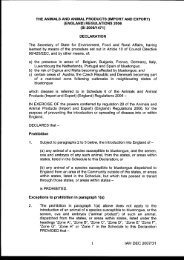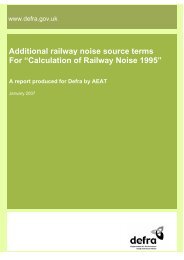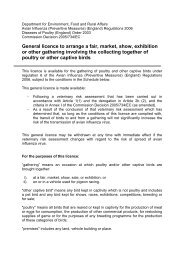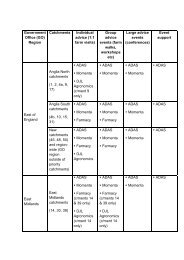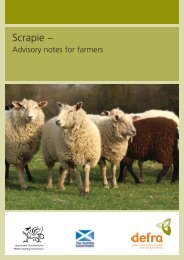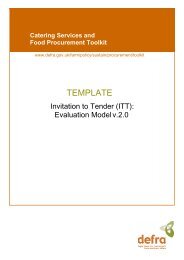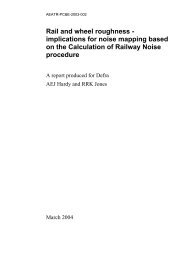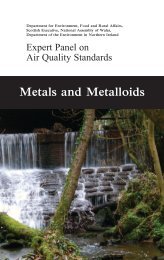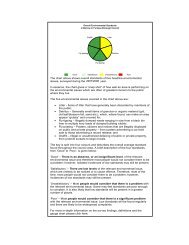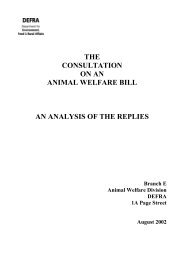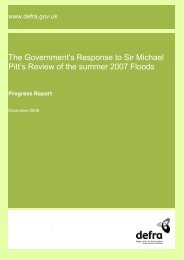Review of the Food-borne Zoonoses Research ... - ARCHIVE: Defra
Review of the Food-borne Zoonoses Research ... - ARCHIVE: Defra
Review of the Food-borne Zoonoses Research ... - ARCHIVE: Defra
Create successful ePaper yourself
Turn your PDF publications into a flip-book with our unique Google optimized e-Paper software.
Project code: OZ0315<br />
Project title: Salmonella pathogenesis and immunity in cattle and<br />
pigs<br />
Start date (dd/mm/yy): 01/04/1999<br />
End date (dd/mm/yy): 30/06/2002<br />
£656,100<br />
Total cost:<br />
Affiliation: Institute for Animal Health, Compton<br />
Abstract <strong>of</strong> research<br />
Salmonella enterica subspecies I is an important cause <strong>of</strong> enteric disease in man and<br />
farmed livestock. Infections <strong>of</strong>ten involve acute enteritis and may be complicated by lifethreatening<br />
systemic sequelae depending on serovar- and host-specific factors. In <strong>the</strong><br />
absence <strong>of</strong> effective vaccines, control and <strong>the</strong>rapy <strong>of</strong> Salmonellosis in livestock relies on<br />
fluid replacement and antibiotic use. Widespread concern exists that <strong>the</strong> latter may lead<br />
to an increase in transmissible antibiotic resistance. Toward <strong>the</strong> development <strong>of</strong><br />
intervention strategies not reliant on antibiotic use, <strong>Defra</strong> project OZ0315 aimed to<br />
identify and characterize factors influencing Salmonella pathogenesis and host<br />
responses in cattle and pigs. We characterized a panel <strong>of</strong> S. enterica serovars <strong>of</strong><br />
differing virulence in calves and pigs and observed that systemic virulence correlated<br />
with enhanced persistence in mesenteric lymph nodes but not <strong>the</strong> response <strong>of</strong> primary<br />
macrophages infected ex vivo. The cell tropism <strong>of</strong> S. enterica serovars in <strong>the</strong> bovine<br />
intestinal mucosa was also examined and host cell-killing by a novel caspase-dependent<br />
mechanism distinct from apoptosis characterized. Systemic translocation <strong>of</strong> S. Dublin in<br />
calves was observed to occur via efferent lymphatics, but not venous blood, in a cell-free<br />
niche. By targeted and genome-wide mutagenesis factors influencing both <strong>the</strong> enteric<br />
and systemic virulence <strong>of</strong> Salmonella in calves and pigs were identified, providing<br />
valuable data for <strong>the</strong> rational attenuation <strong>of</strong> Salmonella for use as live vaccines.<br />
<strong>Review</strong> Summary<br />
This was a good, practical project with an excellent output <strong>of</strong> 18 published papers. It had<br />
provided information on <strong>the</strong> molecular basis <strong>of</strong> salmonella pathogenesis in cattle and<br />
pigs and had <strong>the</strong> potential to assist with control by providing data for <strong>the</strong> rational<br />
development <strong>of</strong> live vaccines. However, it was noted that while this was high-quality<br />
science, it was, for <strong>Defra</strong>‘s purposes, quite distant from practical applications.<br />
The contractors had much expertise in <strong>the</strong> area and used novel techniques to fur<strong>the</strong>r<br />
develop <strong>the</strong> work. There was progress towards identifying suitable vaccine candidates,<br />
but <strong>the</strong> project leader has now left. Project OZ0319 was set up to address some <strong>of</strong> <strong>the</strong><br />
questions raised by this study.<br />
59



